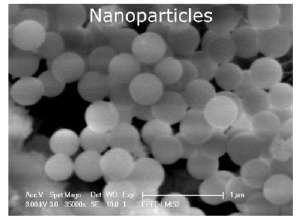Sep 8 2008
Researchers in Switzerland have developed a new method to fabricate borosilicate glass nanoparticles. Used in microfluidic systems, these "Pyrex"-like nanoparticles are more stable when subjected to temperature fluctuations and harsh chemical environments than currently used nanoparticles made of polymers or silica glass. Their introduction could extend the range of potential nanoparticle applications in biomedical, optical and electronic fields.
 Borosilicate glass nanoparticles. Credit: Martin Gijs, EPFL. Copyright Nature Nanotechnology
Borosilicate glass nanoparticles. Credit: Martin Gijs, EPFL. Copyright Nature Nanotechnology
Thanks to their large surface-to-volume ratio, nanoparticles have generated wide interest as potential transporters of antibodies, drugs, or chemicals for use in diagnostic tests, targeted drug therapy, or for catalyzing chemical reactions. Unfortunately, these applications are limited because nanoparticles disintegrate or bunch together when exposed to elevated temperatures, certain chemicals, or even de-ionized water. Using borosilicate glass (the original "Pyrex") instead of silica glass or polymers would overcome these limitations, but fabrication has been impossible to date due to the instability of the boron oxide precursor materials.
In this week's advance online issue of Nature Nanotechnology, a group of EPFL researchers, led by Professor Martin Gijs, reports on a new procedure to fabricate and characterize borosilicate glass nanoparticles. In addition to biomedical applications, the new nanoparticles could also have applications in the production of photonic bandgap devices with high optical contrast, contrast agents for ultrasonic microscopy or chemical filtration membranes.